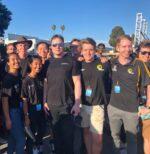Schaeffler-supported UNSW Hyperloop engineers excel in SpaceX high-speed pod competition
A competition highlight: UNSW undergraduate engineers – who recently competed in the SpaceX Hyperloop pod competition – got to meet technology entrepreneur, Elon Musk Schaeffler Australia – part of the global digitalisation and Industry 4.0 leading Schaeffler Group – is taking a further step to enhance ‘mobility for tomorrow’ through its support of the UNSW Hyperloop engineering team. UNSW Hyperloop – which comprises a team of undergraduate engineering students aspiring to innovate the future of high speed travel – recently competed in the SpaceX Hyperloop pod competition, where they placed 7th overall – the best result for a newcomer to the competition. “As a company at the forefront of Industry 4.0 technologies, we are proud to partner with these bright young engineers, who have excelled in their first official Hyperloop pod competition,” said Mr Andre Kluge, Managing Director, Schaeffler Australia. The SpaceX Hyperloop pod competition’s goal is “to support the development of functional prototypes and encourage innovation by challenging student teams to design and build the best high-speed pod.” “In addition to placing 7th out of 21 teams, the UNSW Hyperloop team were the first ever team to successfully complete a self-propelled test run at a first appearance at competition level. However, I think the highlight for many students was getting to meet Elon Musk in person!” said Mr Kluge. SpaceX Hyperloop 2019 The SpaceX Hyperloop 2019 competition was judged on the entrant’s pod’s maximum speed reached, with successful deceleration (i.e. without crashing). All pods were self-propelled and had to use their own communication system. Previous winners of the competition have reached speeds of 284 mph (approx. 457 km/h) in SpaceX’s specially designed tunnel. 2019’s winner – Technical University of Munich – was also supported by Schaeffler, and managed to break that record and achieved 288 mph (463 km/h). UNSW […]










